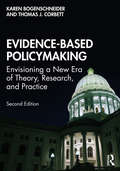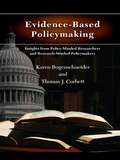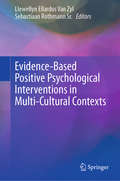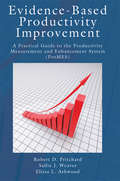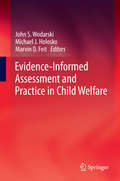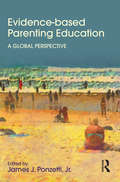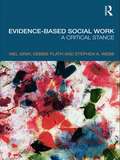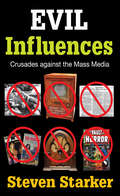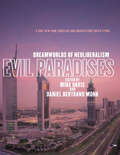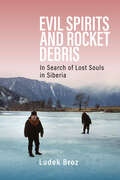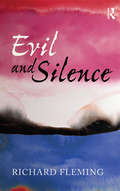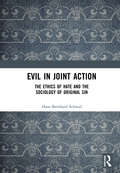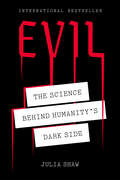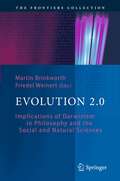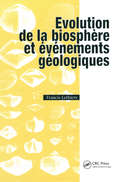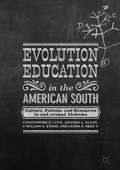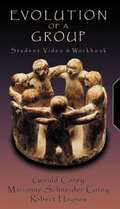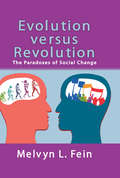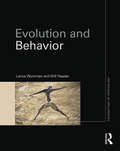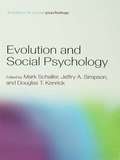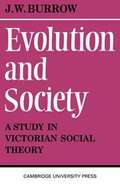- Table View
- List View
Evidence-Based Policymaking: Envisioning a New Era of Theory, Research, and Practice
by Karen Bogenschneider Thomas CorbettNew thinking is needed on the age-old conundrum of how to connect research and policymaking. Why does a disconnect exist between the research community, which is producing thousands of studies relevant to public policy, and the policy community, which is making thousands of decisions that would benefit from research evidence? The second edition updates community dissonance theory and provides an even stronger, more substantiated story of why research is underutilized in policymaking, and what it will take to connect researchers and policymakers. This book offers a fresh look into what policymakers and the policy process are like, as told by policymakers themselves and the researchers who study and work with them. New to the second edition: • The point of view of policymakers is infused throughout this book based on a remarkable new study of 225 state legislators with an extraordinarily high response rate in this hard-to-access population. • A new theory holds promise for guiding the study and practice of evidence-based policy by building on how policymakers say research contributes to policymaking. • A new chapter features pioneering researchers who have effectively influenced public policy by engaging policymakers in ways rewarding to both. • A new chapter proposes how an engaged university could provide culturally competent training to create a new type of scholar and scholarship. This review of state-of-the-art research on evidence-based policy is a benefit to readers who find it hard to keep abreast of a field that spans the disciplines of business, economics, education, family sciences, health services, political science, psychology, public administration, social work, sociology, and so forth. For those who study evidence-based policy, the book provides the basics of producing policy relevant research by introducing researchers to policymakers and the policy process. Strategies are provided for identifying research questions that are relevant to the societal problems that confront and confound policymakers. Researchers will have at their fingertips a breath-taking overview of classic and cutting-edge studies on the multi-disciplinary field of evidence-based policy. For instructors, the book is written in a language and style that students find engaging. A topic that many students find mundane becomes germane when they read stories of what policymakers are like, and when they learn of researcher’s tribulations and triumphs as they work to build evidence-based policy. To point students to the most important ideas, the key concepts are highlighted in text boxes. For those who desire to engage policymakers, a new chapter summarizes the breakthroughs of several researchers who have been successful at driving policy change. The book provides 12 innovative best practices drawn from the science and practice of engaging policymakers, including insights from some of the best and brightest researchers and science communicators. The book also takes on the daunting task of evaluating the effectiveness of efforts to engage policymakers around research. A theory of change identifies seven key elements that are fundamental to increasing policymaker’s use of research along with evaluation protocols and preliminary evidence on each element.
Evidence-Based Policymaking: Insights from Policy-Minded Researchers and Research-Minded Policymakers
by Karen Bogenschneider Thomas J. CorbettThis book is for those who believe that good government should be based on hard evidence, and that research and policy ought to go hand-in-hand. Unfortunately, no such bond exists. Rather, there is a substantial gap, some say chasm, between the production of knowledge and its utilization. Despite much contrary evidence, the authors propose there is a way of doing public policy in a more reflective manner, and that a hunger for evidence and objectivity does exist. The book is pragmatic, drawing on advice from some of the best and brightest informants from both the research and policy communities. In their own voices, researchers provide incisive analysis about how to bridge the research/policy divide, and policymakers provide insights about why they use research, what kind is most useful, where they seek it, and how they screen its quality. The book breaks through stereotypes about what policymakers are like, and provides an insiders’ view of how the policy process really works. Readers will learn what knowledge, skills, approaches, and attitudes are needed to take research findings from the laboratory to lawmaking bodies, and how to evaluate one’s success in doing so. The book’s balance between theory and practice will appeal to students in graduate and upper-level undergraduate courses in family studies and family policy, educational policy, law, political science, public administration, public health, social work, and sociology. This book will also be of interest to researchers who want to bring their ideas into policy debate and to those who work with policymakers to advance an evidence-based policy agenda.
Evidence-Based Positive Psychological Interventions in Multi-Cultural Contexts
by Llewellyn Ellardus Van Zyl Sebastiaan Rothmann Sr.This volume presents clearly defined and described evidence-based positive psychology interventions (PPIs), which have been validated in multi-cultural contexts. It discusses validated PPIs which have been shown to have a significant impact in both clinical and real-world settings. From the late 1990s, there has been an upsurge in popular psychological “self-help” publications drawing from processes and principles of positive psychology. These publications are based on clinically validated PPI studies and translated in a “consumer friendly” manner. However, in these popular works the intervention methods are significantly altered from the original forms, and the contexts of the consumers are meaningfully different from those of the original study populations, the impact on outcome variables are often misinterpreted or over-inflated, and incorrect outcome variables are targeted. Original research articles also do not extensively discuss the content of the interventions, but merely present short descriptions of the PPI. As such, the intervention content cannot accurately be translated into practice. Hence, the need for this volume which discusses in depth how validated PPIs in various multi-cultural contexts work in both clinical and real-world settings.
Evidence-Based Productivity Improvement: A Practical Guide to the Productivity Measurement and Enhancement System (ProMES) (Applied Psychology Series)
by Robert D. Pritchard Sallie J. Weaver Elissa AshwoodThis new book explains the Productivity Measurement and Enhancement system (ProMES) and how it meets the criteria for an optimal measurement and feedback system. It summarizes all the research that has been done on productivity, mentioning other measurement systems, and gives detailed information on how to implement this one in organizations. This book will be of interest to behavioral science researchers and professionals who wish to learn more about the practical methods of measuring and improving organizational productivity.
Evidence-Informed Assessment and Practice in Child Welfare
by Michael J. Holosko John S. Wodarski Marvin D. FeitThis practice-oriented text presents evidence-based assessment methods and interventions that have been extensively field-tested in child welfare settings. The contributors offer empirical and field insights, comprehensive treatment models, and curricula in key areas such as child maltreatment, substance abuse, parent training, social skills, and youth employment interventions. For the professional reader, the book offers real-world guidance on social work practice, from hiring opportunities within a system to promoting lasting change as families and their issues grow increasingly complex. These chapters also take significant steps toward future improvements in child protection systems as the field evolves toward being more coordinated, effective, and professional. Included in the coverage: Legal requisites for social work practice in child abuse and neglect. The integrated model for human service delivery in child welfare. Risk assessment: issues and implementation in child protective services. Substance use and abuse: screening tools and assessment instruments. The process of intervention with multi-problem families. Preventative services for children and adolescents. Its multi-level approach makes Evidence-Informed Assessment and Practice in Child Welfare an essential professional development text for social workers, particularly those new to the job, as well as a progressive blueprint for social work administrators.
Evidence-based Parenting Education: A Global Perspective (Textbooks in Family Studies)
by James J. Ponzetti Jr.This is the first book to provide a multidisciplinary, critical, and global overview of evidence-based parenting education (PEd) programs. Readers are introduced to the best practices for designing, implementing, and evaluating effective PEd programs in order to teach clients how to be effective parents. Noted contributors from various disciplines examine evidence –based programs from the U.S., Canada, Europe, Asia, Australia, as well as web-based alternatives. The best practices used in a number of venues are explored, often by the developers themselves. Examples and discussion questions encourage application of the material. Critical guidance for those who wish to design, implement, and evaluate PEd programs in various settings is provided. All chapters feature learning goals, an introduction, conclusion, key points, discussion questions, and additional resources. In addition to these elements, chapters in Part III follow a consistent structure so readers can easily compare programs—theoretical foundations and history, needs assessment and target audience, program goals & objectives, curriculum issues, cultural Implications, evidence-based research and evaluation, and professional preparation and training issues. The editor has taught parenting and family life education courses for years. This book reviews the key information that his students needed to become competent professionals. Highlights of the book’s coverage include: Comprehensive summary of evidence-based PEd training programs in one volume. Prepares readers for professional practice as a Certified Family Life Educator (CFLE) by highlighting the fundamentals of developing and evaluating PEd programs. Exposes readers to models of parenting education from around the world. The book opens with a historical overview of PEd development. It is followed by 20 chapters divided in four parts. The initial six chapters focus on fundamentals of parenting education --program design, implementation, evaluation, the role of mediators and moderators, as well as the U.S. Cooperative Extension Parent Framework. The three chapters in Part II review the latest status of parenting education in Europe, Asia, and web-based alternatives. Part III presents ten stellar, evidence-based parenting programs offered around the world. In addition to the learning goals, introduction, conclusion, key points, discussion questions, and additional resources that are found in all chapters, those in Part III also consider theoretical foundations and history, needs assessment and target audience, program goals & objectives, curriculum issues, cultural Implications, evidence based research and evaluation, and professional preparation and training issues. Part IV reviews future directions. Ideal for advanced undergraduate or graduate courses in parent education, parent-child relations, parenting, early childhood or family life education, family therapy, and home, school, and community services taught in human development and family studies, psychology, social work, sociology, education, nursing, and more, the book also serves as a resource for practitioners, counselors, clergy members, and policy makers interested in evidence based PEd programs or those seeking to become CFLEs or Parent Educators.
Evidence-based Social Work: A Critical Stance
by Stephen Webb Mel Gray Debbie PlathEvidence-based practice is now a core element of many governments’ approaches to policy-making and social intervention. It has become a powerful movement that promises to change the content and structure of social work and its allied professions. Its emergence has generated much debate and raised challenging questions, however, particularly at the interface of research, policy, and practice. This book provides a critical analysis of evidence-based practice in social work. It introduces readers to the fast changing research, policy, legislative, and practice context. It discusses what constitutes knowledge in social work, the values and beliefs that lie behind EBP and problems of implementation, formalisation and resource management. Reflecting on the challenges of transferring evidence-based practice to frontline social work practice, the authors argue that social work practice is not easily measured and systematised into best practice guidelines that disseminate proven diagnostic and effective intervention knowledge. Using Actor Network Theory for the first time in the social work literature, Evidence-based Social Work illuminates how adopting the methodology and language of evidence-based practice fundamentally alters the conditions under which social work takes place. This book is vital reading for academics, practitioners, and students with an interest in contemporary social work practice and research.
Evidenzbasierte psychische Gefährdungsbeurteilung: Prinzipien und Instrumente für Entscheider in der betrieblichen Praxis (essentials)
by Holger Pfaff Lara Lindert Sabrina ZeikeDieses essential stellt ein wissenschaftlich fundiertes System der psychischen Gefährdungsbeurteilung vor, das den gesetzlichen Vorgaben entspricht. Es zeigt auf, welche Schritte ein umfassendes und betriebsspezifisches Gefährdungscontrolling beinhaltet und welche Rolle der psychischen Gefährdungsbeurteilung in diesem Prozess zukommt. Die Methode der evidenzbasierten psychischen Gefährdungsbeurteilung dient als Grundlage, um Gefährdungen adäquat zu erfassen und wirksame (Gegen-)Maßnahmen einzuleiten und hilft bei der Implementierung des Gefährdungscontrollings. So kann ein kontinuierlicher und nachhaltiger Lernprozess im Unternehmen angeregt werden, von dem Arbeitnehmer und Arbeitgeber profitieren.
Evidenzbasierung in der Arzneimittelversorgung: Resiliente Ideen und institutioneller Wandel im Ländervergleich
by Markus GrunenbergEvidenzbasierung ist heute ein unverzichtbarer Standard bei der Bewertung von Arzneimitteln. Obwohl Gesundheitssysteme weltweit das gemeinsame Ziel verfolgen, die Patientenversorgung durch Evidenzbasierung zu verbessern, unterscheiden sich die gesetzliche Ausgestaltung und praktische Umsetzung evidenzbasierter Verfahren oft erheblich. Dieses Buch untersucht, wie institutionelle Rahmenbedingungen sowie gesundheitspolitische und öffentliche Diskurse in Deutschland, England und den USA die Entwicklung der Evidenzbasierung prägen. Es zeigt, wie institutionelle Anpassungen, strategische Kommunikation und emotionale Argumente die Etablierung von Evidenzbasierung beeinflussen. Die Analyse verdeutlicht, dass trotz unterschiedlicher institutioneller Ausgangsbedingungen ähnliche Problemstellungen häufig zu vergleichbaren Zielsetzungen und Veränderungen führen. Dennoch bleiben nationale Besonderheiten in der praktischen Umsetzung bestehen. Evidenzbasierung erweist sich dabei als resiliente Idee, die sich trotz dynamischer Diskurse und institutionellem Wandel langfristig in allen untersuchten Gesundheitssystemen etabliert hat.
Evil Influences: Crusades Against the Mass Media
by Steven StarkerEach new development in the mass media has elicited highly charged criticism from alarmed observers. Comics, romance novels, music videos, and even movies, radio, and television have all been denounced as threats to children, teenagers, adults, and even the stability of civilization itself. Organized into community groups, citizens have repeatedly taken militant action against the media, ranging from book burnings to blacklisting and from harassment of individual publishers to attempts to regulate entire industries. Investigative committees and commissions are not uncommon. What is it about the media that generates such attacks? 'Evil Influences' examines the historical, sociological, and psychological background of current controversies regarding the media. Starker finds that even though it is couched in logic or scientific theory, such hostility is almost always a byproduct of fear--fear of imagination and fantasy, fear of change, fear of human aggression and sensuality. Successive media developments have challenged traditional perceptions and habits by introducing powerful visual and emotional elements into mass communication. Because they frighten and threaten a part of the audience, new forms of mass media engender public outrage and become easy scapegoats, accused of everything from stimulation of violence to promotion of conformity. This book is addressed to those who inevitably participate in media debates--social scientists, educators, communications professionals, the clergy, and educated parents. Its intention is to prepare us for the arrival of new media forms and their associated threats.
Evil Paradises
by Mike Davis Daniel Bertrand MonkEvil Paradises, edited by Mike Davis and Daniel Bertrand Monk, is a global guidebook to phantasmagoric but real places--alternate realities being constructed as "utopias" in a capitalist era unfettered by unions and state regulation. These developments--in cities, deserts, and in the middle of the sea--are worlds where consumption and inequality surpass our worst nightmares. Although they read like science fiction, the case studies are shockingly real. In Dubai, where child slavery existed until very recently, a gilded archipelago of private islands known as "The World" is literally being added to the ocean. In Medellín and Kabul, drug lords--in many ways textbook capitalists--are redefining conspicuous consumption in fortified palaces. In Hong Kong, Cairo, and even the Iranian desert, burgeoning communities of nouveaux riches have taken shelter in fantasy Californias, complete with Mickey Mouse statues, while their maids sleep in rooftop chicken coops. Meanwhile, Ted Turner rides herd over his bison in 2 million acres of private parkland. Davis and Monk have assembled an extraordinary group of urbanists, architects, historians, and visionary thinkers to reflect upon the trajectory of a civilization whose deepest ethos seems to be to consume all the resources of the earth within a single lifetime.
Evil Spirits and Rocket Debris: In Search of Lost Souls in Siberia
by Ludek BrozThe Altai Republic in southern Siberia is renowned for excavations of frozen mummies from high-altitude burial sites. Less well-known is the fact that it hosts fallout zones for the second stages of rockets launched from the Baikonur cosmodrome. Local inhabitants blame ‘evil spirits’ released by archaeological work and toxic fuel from rocket debris for their misfortunes. This book explores the divergent fates of such claims when confronted with state-fostered ‘rationalisms’ of science and governance.
Evil and Silence (Media and Power)
by Richard FlemingInspired by Ludwig Wittgenstein and Stanley Cavell, this book is a profoundly original philosophical work put together as a network of quotations, to show that our language is never our own and that ethics can be understood as an effect of our attitude to language. It is a meditation on justice and addresses the question of how to lead a non-violent life and acknowledge the humanity of others following 9/11 and extending right up to the current moment.Using extensive interdisciplinary sources, "Evil and Silence" investigates the nature of evil and the ways to make a life worth living in the face of such a fact of existence. It argues that we must reject the choice of violence as a justified way of life and embrace the creative efforts of nonviolence. The text begins with Socrates argument that it is never just to harm another and ends with Cage s exploration of silence as all the sounds we don t intend. Drawing on his past work in philosophy of language and music, Fleming develops arguments for the logic of nonviolence and the value of silence. He demonstrates that living consistently by way of silence and meaningful sound, understanding the music and language of our lives, is a justified response to the truth and miseries of evil.Links to Musical Illustrations and Scores Mentioned in the TextMozart's "Symphony 40," Beethoven's "Symphony 6," and Ives' "The Unanswered Question" http: //www.leonardbernstein.com/norton_scores.htmMozart's "Symphony 40"Beethoven's "Symphony 6"First page of Wagner's "Tristan und Isolde" http: //www.dlib.indiana.edu/variations/scores/bfk2835/index.htmlFirst page of Wagner's "Parsifal" http: //www.dlib.indiana.edu/variations/scores/baj5813/index.htmlFirst and second pages of Debussy's "Prelude to the Afternoon of a Faun" http: //www.dlib.indiana.edu/variations/scores/bgn9673/index.htmlAn original manuscript page from Schoenberg's Opus 23, "Five Piano Pieces" http: //www.schoenberg.at/scans/Ms23/Ms23/10.jpgThe central tone-row from Berg's "Violin Concerto" (section B) and the last page of "Wozzeck" http: //solomonsmusic.net/wozzeck.htmLast page of Mahler's "Symphony 9" http: //imslp.info/files/imglnks/usimg/5/5d/IMSLP21194-PMLP48640-Symphony_No._9_-_IV.pdfFirst page of Stravinsky's "Petrushka" http: //www.dlib.indiana.edu/variations/scores/aad9501/index.htmlPage from Bernstein's "Mass" http: //www.leonardbernstein.com/mass_scores.htmPage from Tchaikovsky's "Symphony 6" http: //www.leonardbernstein.com/norton_scores.htmCage's "4'33''" manuscript page and precursor materials: http: //solomonsmusic.net/4min33se.htm "
Evil in Joint Action: The Ethics of Hate and the Sociology of Original Sin
by Hans Bernhard SchmidJoining insights from social science and philosophy, this book offers a nuanced view on the discourse of evil, which has been on the rise in the West in recent years. Exploring the famous ‘Pear Theft’ episode in St Augustine’s Confessions, it looks beyond the theological implications of the event to focus instead on the secular insights that it offers when the event is placed in the context of social thought. With attention to Augustine’s lengthy reflections on a seemingly marginal episode, the author contends that it is possible to discern the elements of a convincing account of intentional evil action, the Pear Theft representing a case of joint radical improvisation that lacks collective deliberation. As such, a new perspective emerges on familiar and more intuitive forms of evil in joint action that involve group identification and institutional action. Evil in Joint Action will appeal to scholars of sociology, social theory and philosophy with interests in ethics, collective action and concepts of evil.
Evil in the Modern World: International and Interdisciplinary Perspectives
by Laura Dryjanska Giorgio PacificiThis interesting volume focuses on a set of phenomena which increasingly alarm the political world and public opinion: from the more obvious ones like torture, disease, human trafficking, abuse, genocide, displacement, to more subtle forms found in sports, technology and law. It looks at how and why these phenomena are universally condemned, and could be considered to threaten the very foundations of modern democracy; yet continue to be tolerated. The volume therefore goes beyond what Hannah Arendt has called the "banality of evil" and discusses the presence of condemned and heinous practices in society as fluid and chaotic but as non-trivial; capable of great transmutations through various epochs. Practices and actions considered as "evil" manifest in situations where individuals or groups hold power or seize power, and the contributions in this volume explore the close relation between power and evil. The volume draws upon sociology, psychology, cultural studies, political science, as well as philosophy, theology, anthropology, and neurology of the individual and of the group to provide a comprehensive understanding of the multiple facets of evil in the contemporary world.
Evil: The Science Behind Humanity's Dark Side
by Julia ShawAn expert in criminology and psychology uses science to understand evil in today’s society.What is it about evil that we find so compelling? From our obsession with serial killers to violence in pop culture, we seem inescapably drawn to the stories of monstrous acts and the aberrant people who commit them. But evil, Dr. Julia Shaw argues, is largely subjective. What one may consider normal, like sex before marriage, eating meat, or working on Wall Street, others find abhorrent. And if evil is only in the eye of the beholder, can it be said to exist at all? In Evil, Shaw uses an engrossing mix of science, popular culture, and real-life examples to break down timely and provocative issues. How similar is your brain to a psychopath’s? How many people have murder fantasies? Can artificial intelligence be evil? Do your sexual proclivities make you a bad person? Who becomes a terrorist? If you could travel back in time, would you kill baby Hitler? In asking these questions, Shaw urges readers to discover empathy and to rethink and reshape what it means to be bad. Evil is a wide-ranging exploration into a fascinating, darkly compelling subject from wickedly smart and talented writer.Praise for Evil“A brilliant panorama that elucidates humanity’s dark side. . . . This science-based foundation for studying the minds of sadists, mass murderers, freaks and creeps, as well the new role of tech in promoting evil is presented in a totally engaging fashion.” —Philip Zimbardo, PhD; Professor Emeritus, Stanford University; author of The Lucifer Effect“This overview of various kinds of aberrant behavior grouped under the umbrella term evil is well backed up by the expertise of Shaw. . . . Shaw’s work will be particularly appropriate for college and high school libraries for its sober-minded, academically rigorous examination of an oft-sensationalized subject.” —Publishers Weekly“Capably written with a smooth mix of scientific insight and theoretical thought, the book will hopefully inspire empathy and understanding rather than hysteria and condemnation. A consistently fascinating journey into the darker sides of the human condition that will push on the boundaries of readers’ comfort zones.” —Kirkus Reviews
Evolution 2.0
by Friedel Weinert Martin BrinkworthThese essays by leading philosophers and scientists focus on recent ideas at the forefront of modern Darwinism, showcasing and exploring the challenges they raise as well as open problems. This interdisciplinary volume is unique in that it addresses the key notions of evolutionary theory in approaches to the mind, in the philosophy of biology, in the social sciences and humanities; furthermore it considers recent challenges to, and extensions of, Neo-Darwinism. The essays demonstrate that Darwinism is an evolving paradigm, with a sphere of influence far greater than even Darwin is likely to have imagined when he published 'On the Origin of Species' in 1859.
Evolution De La Biosphere Et E
by Francis LethiersThe evolution of the living world has not been straightforward process over geological time. On the contrary, it shows episodes of crises separating phases of evolving radiation. This work, presenting an assessment of the paleontological discoveries of the last fifteen years, could be summed up by the formula "the evolution of life on our planet or biodiversity". This book, which combines clarity of presentation with scientific rigor, will be of interest to biologists and geologists as well as teachers, students and all those wishing to extend their knowledge on the subject.
Evolution Education in the American South
by Christopher D. Lynn Amanda L. Glaze William A. Evans Laura K. ReedThis volume reaches beyond the controversy surrounding the teaching and learning of evolution in the United States, specifically in regard to the culture, politics, and beliefs found in the Southeast. The editors argue that despite a deep history of conflict in the region surrounding evolution, there is a wealth of evolution research taking place--from biodiversity in species to cultural evolution and human development. In fact, scientists, educators, and researchers from around the United States have found their niche in the South, where biodiversity is high, culture runs deep, and the pace is just a little bit slower.
Evolution Of A Group: Student Video And Workbook
by Gerald Corey Marianne Schneider Corey Robert Haynes Julie Martinez Caroline ConcillaIn this exciting video with accompanying workbook, students will see Jerry and Marianne Corey in action as they demonstrate their integrative approach to group work. <P><P>As the 90 minutes of video unfold, viewers will see the group move through its various stages and will observe as group members discuss real issues and present reactions in the group context. <P><P>The accompanying student workbook provides exercises and explorations that link the video to the Coreys' best-selling group books: GROUPS: PROCESS AND PRACTICE, GROUP TECHNIQUES, and THEORY AND PRACTICE OF GROUP COUNSELING AND PSYCHOTHERAPY.
Evolution Versus Revolution: The Paradoxes of Social Change
by Melvyn L. FeinRevolutionary and evolutionary theorists have very different views about change; Fein writes in favour of evolution. He proposes an integrated model of social evolution, one that accounts for the complexity, inconclusiveness, and impediments that characterize social transformations.This multi-dimensional approach recognizes that change is always saturated in conflict. Major changes are rarely initiated by conscious decisions that are automatically implemented; power and morality generally control the direction that significant alterations take. Fein explains how the social generalist dilemma places our need for both flexibility and stability in opposition to each other such that non-rational mechanisms are needed to produce a solution. He also describes how an "inverse force rule" dictates that small societies are bound together by strong social forces, whereas large ones are secured by weak forces. This suggests that social roles are likely to become professionalized over time.If social change is, in fact, analogous to natural rather than artificial selection, we may be in the midst of an only partially predictable middle class revolution. Indeed, the current impasse between liberals and conservatives may be evidence that we are in the consolidation phase of this process. Should this be the case, a paradigm shift, not a classical revolution, is in our future.
Evolution and Behavior
by Lance Workman Will ReaderThe relationship between how we evolved and how we behave is a controversial and fascinating field of study. From how we choose a mate to how we socialize with other people, the evolutionary process has an enduring legacy on the way we view the world. Evolution and Behavior provides students with a thorough and accessible introduction to this growing discipline. Placing evolutionary psychology in context with the core areas of psychology – developmental, cognitive and social – the book explores some of the most fundamental questions we can ask about ourselves. Taking students through the principles of natural selection, it provides a nuanced understanding of key topics such as: cognitive development and the role of intelligence, memory, emotions and perception, mental health and abnormal psychology, sexual reproduction and family relationships, the development of culture. Addressing a number of controversial debates in the field, each chapter also includes concept boxes, the definition of key terms, chapter summaries and further reading. This is the ideal introductory textbook for anyone interested in evolutionary psychology. It will provide not only an essential overview of this emerging field, but also deepen readers’ appreciation of the core tenets of psychology as a whole.
Evolution and Gender: Why It Matters for Contemporary Life
by Rosemary L. HopcroftOffering new research and analysis on the relation between gender and evolution, this book explains conflict between the sexes and the frequent emergence and stubborn continuation of patriarchal regimes that serve to control the behavior of women in societies around the world, both past and present. Women and men are different, on average. But that does not mean they are unequal. Indeed, understanding average differences is key to the full realization of equality in health care and other dimensions of social life. Hopcroft shows that gender differences in physiology, psychology, and behavior can be traced to slight differences in evolved traits between men and women. These differences exist because of sex differences in investment in offspring, which meant that, in the environment of evolution, some adaptive problems were more important for men to solve than for women, and vice versa. For men, the most important adaptive problem to solve was that of finding a mate. Men who did not solve this problem are not our ancestors. For women, the most important adaptive problem to solve was that of successfully bearing and raising children. Women who did not solve this problem are not our ancestors. These small differences underlie all the differences described in the book, including sex differences in mate preferences, physiology, cognition, aggression, status striving, and emotional experience. It can also help explain the differential treatment of children by parents, the differential success of boys and girls in modern schools, and sex differences in style of communication.
Evolution and Social Psychology (Frontiers of Social Psychology)
by Douglas T. Kenrick Jeffry A. Simpson Mark SchallerWhy do we think about and interact with other people in the particular ways that we do? Might these thoughts and actions be contemporary products of our long-ago evolutionary past? If so, how might this be, and what are the implications? Research generated by an evolutionary approach to social psychology issues profound insights into self-concept, impression formation, prejudice, group dynamics, helping, aggression, social influence, culture, and every other topic that is fundamental to social psychology. Evolution and Social Psychology is the first book to review and discuss this broad range of social psychological phenomena from an evolutionary perspective. It does so with a critical and constructive eye. Readers will emerge with a clear sense of the intellectual challenges, as well as the scientific benefits, of an evolutionarily-informed social psychology. The world-renowned contributors identify new questions, new theories, and new hypotheses—many of which are only now beginning to be tested. Thus, this book not only summarizes the current status of the field, it also sets an agenda for the next generation of research on evolution and social psychology. Evolution and Social Psychology is essential reading for evolutionary psychologists and social psychologists alike.
Evolution and Society: A Study in Victorian Social Theory
by J. W. BurrowIn this 1966 text Dr Burrow investigates the reasons why Victorian pioneers of social science were habitually approaching the study of other societies with largely positivistic and evolutionary methodologies. As a result of this, anthropology appeared to be seeking affirmation of assumed laws and stages of progress, rather than looking to appreciate and understand other societies in terms of their own uniqueness and functionality. Here, the author not only studies Victorian thought on evolution in general, but also seeks to contextualise those ideas which are often classified as exclusively Darwinist within the studies and writings of other leading figures in Victorian science and social science, whose works often predate The Origin of the Species. His book also makes an incredibly important contribution to the ways in which ideas on evolution and society operated within the framework of general Victorian thought and assumption.
